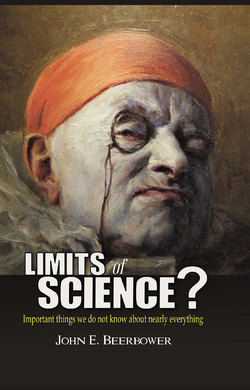Читать книгу Limits of Science? - John E. Beerbower - Страница 23
На сайте Литреса книга снята с продажи.
Testing and verification
ОглавлениеAs suggested above, increasingly in modern physics and related subjects, the efforts to find testable, empirical propositions that are predicted by the theories has led to hypotheses that are distant, minor implications of the theory, not matters at the core, or that are themselves heavily theory-laden and not directly observable. That is, the potentially observable or measurable aspect of the prediction is a theory driven implication from the prediction. Thus, a failure of the test is susceptible to many potential explanations that preserve the central core of the theory, in other words, the central theory is not really falsifiable by that test. See, e.g., Imre Lakatos, “Science and Pseudoscience,” Philosophical Papers, vol. 1 (1977), pp.1–7.25
There is another type of problem. Economists regularly make predictions based upon their theories. The “problem” is that economists seem always to have explanations for why their predictions did not come true—explanations that often are quite consistent with the theory. The typical explanation will invoke the ceteris paribus condition or assumption. As discussed at some length below, the question then arises as to whether such theories could ever satisfy (or purport to satisfy) the falsifiability requirement. One aspect of the problem arises from the difficulties with respect to the specification of the initial conditions as a prelude to making predictions.
The laws of science have been characterized as descriptions of how things change or how circumstances evolve over time. See, e.g., Barrow, Theories of Everything, p.31. However, even if one were to have a theory of change that faithfully reflected reality, the accuracy of the predictions will depend upon the initial conditions from which the process of change occurs. Many theories simply do not have an adequate specification of the initial conditions to enable unique predictions.26 One might mistakenly assume that minor errors in the specification of the initial conditions would result only in minor errors in the predictions; however, it is clear that there are systems in which very small, apparently trivial differences in the initial conditions will result in enormous differences in the final results over time. Id., p.41.27 Perhaps the most familiar example is the weather (the notorious hypothetical flutter of a butterfly’s wings “causing” a devastating storm half a world away). See, e.g., Rees, From Here to Infinity, p.91.
More generally, systems that may be described as chaotic may appear not to be deterministic, because they seem to be unpredictable. In fact, chaotic systems may be deterministic, at least in theory, in the sense that the same result will also be obtained from the same initial conditions; but, the specification of those conditions would clearly exceed current and, perhaps, foreseeable human capabilities. Yet, with such systems, a simulation of a representative or completely plausible outcome is achievable, and such analyses may be of considerable value in the understanding of the nature of the phenomena at issue even if falsifiable predictions cannot practically be generated. See, e.g., Roger Penrose, Shadows of the Mind, pp.21–3. Thus, there are useful and accepted theories that do not and cannot generate unique, specific predictions.
